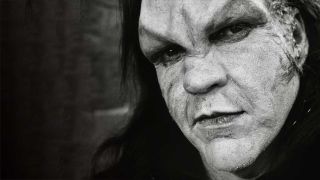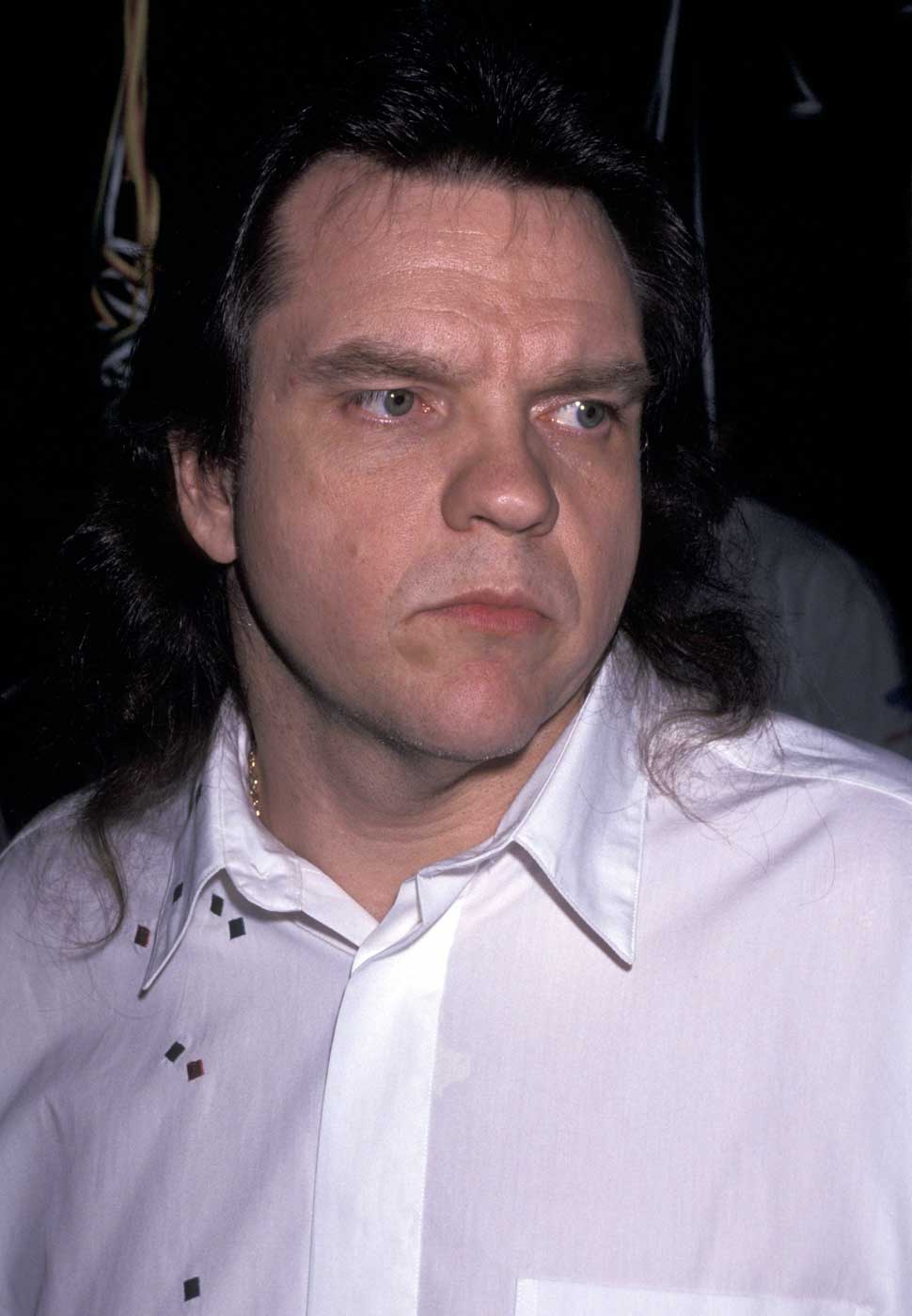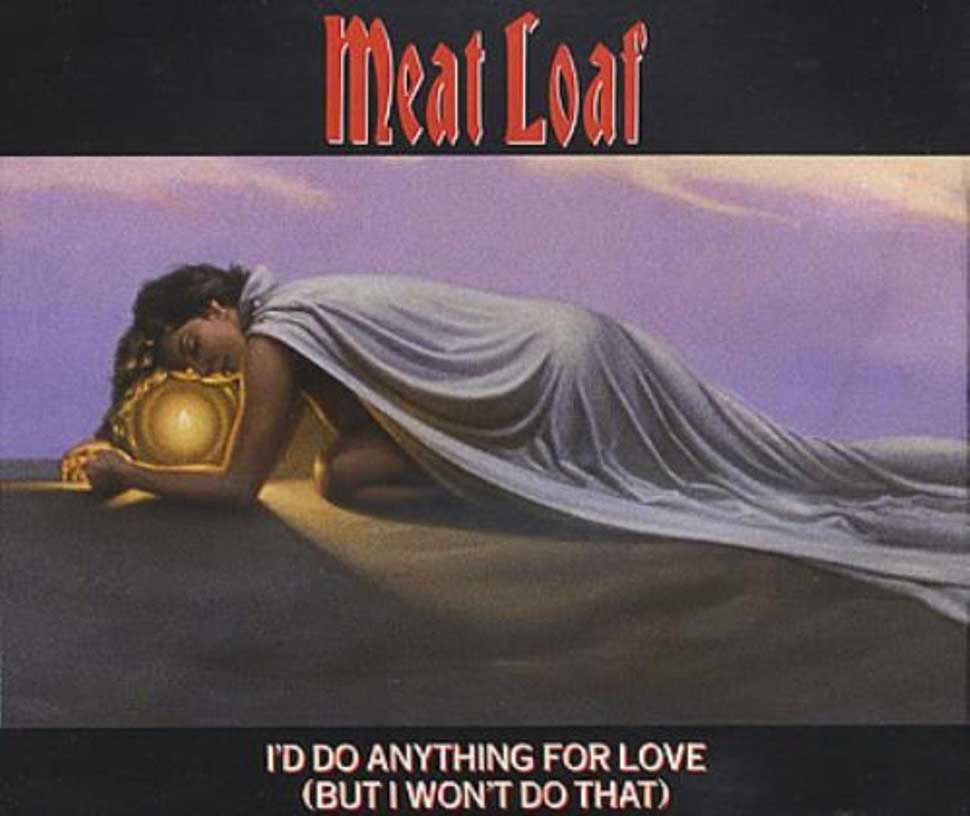If I Could Do It All Over Again I Wouldnt
The story behind Meat Loaf's I'd Do Anything For Love (But I Won't Do That)

There's a special circle of hell reserved for people who ask the question: "What is it that Meat Loaf wouldn't do for love?" The man himself spent the last 30 years politely and impolitely dealing with the query every time some smirking journalist threw it his way in an interview, like no-one had ever thought to ask him before. Following the singer's death on January 20, 2022, a new generation of numbskulls took to Twitter to trot it out all over again: "So, what was it that Meat Loaf wouldn't do for love?"
As anyone with an IQ higher than room temperature could tell you, the answer is right there within the song in question, I'd Do Anything For Love (But I Won't Do That). Meat Loaf himself explained it with the help of a chalkboard on an episode of VH1's Storytellers. Yet this enduring non-mystery is integral to the mythos of the singer's gargantuan 1993 mega-hit, a 12-minute rock opera that barrelled through grunge's pity party like a juggernaut in a frilly shirt as it yelled out a prayer to the god of sex and drums and rock'n'roll.
That song, too knowing to take itself seriously yet too OTT to be a joke, restored Meat and songwriter/musical soulmate/sometime antagonist Jim Steinman to their rightful place at rock'n'roll's top table in the process.
The story goes that Meat Loaf was on the ropes for most of the 80s, reduced to threatening to push members of the British royal family into moats on cheesy TV gameshows and having to dodge flying wheelchairs at gigs in the backwaters of Ireland.
And it's true, the glory days of Bat Out Of Hell were a speck in the rearview mirror, and getting smaller every day. But whatever Meat Loaf was, he wasn't a quitter. "I didn't go anywhere," he said a few years later. "I've never stopped playing, I've never stopped performing, I've always been here. You guys are just now recognising that."

Jim Steinman wasn't a quitter either. The creative furnace which powered Bat Out Of Hell had flamed out soon after follow-up Deadringer, choked by circumstance, ego and bone-headed idiocy. Steinman was still making music – with Bonnie Tyler, the Sisters Of Mercy, his all-female group Pandora's Box and even, for a couple of tracks on Meat Loafs underpowered 1984 album Bad Attitude, his old partner-in-crime – but the fact was they missed each other. Badly.
They hadn't exactly lost touch, but a series of lawsuits meant that, as Steinman put it, "we were hardly exchanging recipes." But somehow these two rock'n'roll exoplanets re-entered each others' orbits over Christmas 1989, when Steinman visited Meat's house and the pair began playing Bat Out Of Hell together on the piano. Soon they properly reactivated their musical partnership and hatched a plan to do the one thing guaranteed to put them back in the game: make a sequel to Bat Out Of Hell.
"I didn't call it Bat Out of Hell II just to identify with the first record," said Steinman of the album they made together. "It was a chance to go back to that world and explore it deeper. It always seemed incomplete because I conceived it like a film, and what would you do without Die Hard 2?"
Meat Loaf was more prosaic. "We called it Bat Out of Hell II, cos that would help it sell shitloads."
The details of recording Bat Out Of Hell II are lost to the mists of time, though it took a suitably monstrous 22 months to make. One of the most memorable stories to emerge was that Steinman wasn't happy that his old sparring partner had shed a few pounds. "I've always been convinced that his vocal chords are directly related to his id," said Steinman, who apparently rectified the problem by leaving doughnuts around the studio for the singer to scoff.
Ever the master of cannibalising his own past, Steinman pulled four of the album's tracks from his lone solo album, Bad For Good, and another two from Pandora's Box's glorious but ignored 1989 album Original Sin. I'd Do Anything For Love (But I Won't Do That) was one of the brand new songs, more or less, though its title was lifted from a line in Getting So Excited, a track from Welsh belter Bonnie Tyler's Steinman-produced 1983 album Faster Than The Speed Of Night. The latter was itself a cover of a late-era disco track by early 80s no-hit-wonder Lee Kosmin, though Steinman and Tyler had inserted the line "I'd do anything for love… but I won't do that" as a brief spoken-word interlude in their version.

By the time Steinman and Meat Loaf had worked their magic, that throwaway line had become the song's conceptual hook. But killer concept needs a killer soundtrack to back it up, I'd Do Anything For Love took the sound they'd cooked up back in 1977 – leather-clad rock'n'roll by way of Phil Spector and Richard Wagner – and kicked it into present. The result was the 90s power ballad to end all 90s power ballads.
It began with a revving engine, a deliberate callback to Bat Out Of Hell, the song that started it all, but this owed more to Paradise By The Dashboard Light's tale of thwarted love, albeit with Meat Loaf desperately crying out for his amour fou's affection rather than bullheadedly demanding it. "And I would do anything for love, I'd run right into hell and back," sang Meat Loaf in the song's opening lines, his voice a jolt of emotion against a stark piano and distant choir (he once said he sang every song in character, and the character in I'd Do Anything For Love was a 15-year-old boy).
There's a lot to unpack in the song's first nine minutes, but it's essentially Meat Loaf counting off the reasons why he'd make the perfect boyfriend material (never lying to her, taking a vow and sealing the pact, being there until the final act, etc) over music that switches between still night skies and almighty thunderstorms as our protagonist prays to "the god of sex and drums and rock'n'roll."
But it's in the last three minutes when things really hot up. Repeating the trick he pulled on Paradise By The Dashboard, Steinman parachutes in a female singer to embody the object of Meat Loaf's desire and provide a duetting partner for him bounce off. In this case it was little-known British vocalist Lorraine Crosby, who provided an early guide vocal that was so on-the-money it eventually ended up on the album (Crosby, who was managed by Steinman, was credited as Mrs Loud on the album).
It's here, over six verses, that Meat and Crosby get to the heart of the matter. Crosby lists the things she'd want for their romance to work out, including love, devotion, and implausible Wizard Of Oz-themed architecture ("Can you build an emerald city from these grains of sand"), to which Meat replies that, yes, he can do that.
Then Crosby flips the script. If they did get it on, would he dump her straight after and forget about her? No, says Meat Loaf quietly, "I won't do that." If they do make a go of it, would he eventually cheat on her and spend his time "screwing around"? "No," he says, more stridently this time. "I won't do that." And there you have it. In two verses, Meat Loaf has laid out exactly what he wouldn't do for love.
It's a killer pay-off made all the greater by the epic build up that preceded it, and it's as honest and unironic as Paradise By The Dashboard Light was winking and OTT. Here was further proof that few people could deliver romance on as grand a scale as Meat Loaf and Jim Steinman, even if at least one of them was unsure whether people would understand the song's complexity.
"When we were recording it, Jim brings up the thing," said Meat Loaf in 2014. "He says, 'People aren't gonna know what 'that' is.' I said, 'Of course they are. How can they not know?' He goes, 'They're not gonna.'"
Typically, Steinman disagreed with his partner's view of things. "What he 'won't do' is said about six times in the song very specifically," he wrote on his website. "It's sort of a little puzzle… 'I won't stop doing beautiful things and I won't do bad things.' It's very noble. I'm very proud of that song because it's very much like out of the world of Excalibur. To me, it's like Sir Lancelot or something - very noble and chivalrous."

The public might have struggled with the song's central concept, but that didn't stop them buying it. Released on August 30, 1993 and accompanied by a lavish, Michael Bay-directed video that played out like a heavy metal Beauty And The Beast with a heavily made-up Meat as the Beast and model Dana Patrick miming along to Lorraine Crosby's parts, the song gave the singer his very first Number One single in both the US and the UK, a feat repeated in several other countries too. Bat Out Of Hell II followed its lead single to the top of the charts on both sides of the Atlantic (amazingly, the original Bat Out Of Hell got no higher than Number 14 on the Billboard Charts).
And Meat Loaf and Steinman's newly rekindled relationship? That remained as combustible as it ever was. There were reunions and falling outs, more lawsuits and more rapprochements. Meat Loaf recorded more Steinman songs, and even made a Bat Out Of Hell III, though his old oppo's non-involvement ensured it was a pale shadow of past glories. But the two would never work as closely as they did on the Bat… albums, much to Meat's annoyance. "Unfinished business? I'm gonna say yeah," he said in 2011, snarkily adding: "I keep reading these things about Jim working with Madonna. I'd love to be a fly on the wall on that one."
Now Jim Steinman is gone and so is Meat Loaf. They haven't taken the question of what the "that" in I'd Do Anything For Love (But I Won't Do That) means to the grave with them, though they may as well have done for all the people still talking about it. But that line, and the song it came from, stands as a highpoint of a partnership like no other, one that did the god of sex and drums and rock'n'roll proud.
Source: https://www.loudersound.com/features/the-story-behind-meat-loafs-id-do-anything-for-love-but-i-wont-do-that
0 Response to "If I Could Do It All Over Again I Wouldnt"
Post a Comment